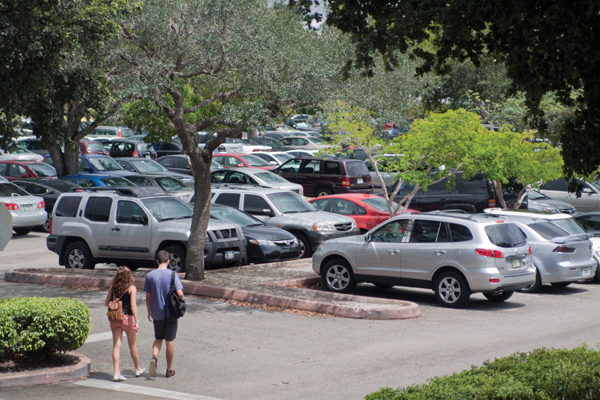
Students chatting as they walk through the tree-lined Coral Gables streets. A jam session between friends on a long carpool to campus. A breezy morning bike ride to class. This is the eco-friendly future the University of Miami’s Department of Parking and Transportation envisions.
And the university could get one step closer to that dream with the launch of the RideFlag app, a service that is “like Uber or Lyft” but for arranging carpools with people in the same community.
“We thought, ‘Wow, this is much safer for our students that they can stay within the circle and not be riding with a complete stranger,’” said Lluvia Resendiz, mobility manager for Parking and Transportation at UM.
But the system only works if enough people sign up – “the better the chance of getting a ride,” Resendiz said – so Parking and Transportation is making a big push for app downloads with a competition organized by UM partner South Florida Commuter Services.
The South Florida Commuter Challenge pits 12 Florida universities against each other to see which students can log the most alternative modes of transportation – carpools, bikes, walks, public transportation – on RideFlag from Nov. 6 to Nov. 17.
The winning student will receive a sweet payback for all those gas-guzzling miles: a $2,500 scholarship grant and two tickets to a Miami Heat game.
JP Becerril, president of the Association of Commuter Students, said the university’s efforts are a good start, but the commuter student parking issue is much more complicated.
“A lot of commuter students not only live in Broward, where it’s much more difficult to coordinate a ride, but they tend to be involved and stay pretty late on campus,” Becerril said.
In areas like Doral, where Becerril and many other students live, access to time-effective public transportation is scarce. And having to go out of the way to pick up friends from the same area can add more time than anticipated to a commute. There are too many factors at work for this proposed plan to cure all commuter woes, Becerril said.
“I understand the direction the school is trying to move toward, but it’s just not ideal for commuters,” he said.
Part of the problem is that all commuters get equal standing when it comes time to buy parking permits. Those who live across 57th Avenue, in Red Road Commons, can get the same pass as those who drive an hour every morning from Broward County.
“Even doing something like having commuters who live a certain distance away from campus having first priority for parking passes would make a difference,” Becerril said.
UM will use the commuter challenge to gauge interest in the RideFlag system and plan the next steps. Last week, Parking and Transportation announced the university would be implementing a more eco-friendly, license plate-based permit system by spring 2018.
And within the next few months, students will be able to upgrade parking permits by picking up a few friends along the way.
For example, if a student with a yellow parking pass carpools with another student, the two will be automatically upgraded to more in-demand lots, such as purple or red, for the day. All of it will work through license plate-based permitting and be monitored through RideFlag.
The goal, Resendiz said, is “to reduce carbon emissions and the miles traveled per vehicle, single occupancy” and, in the longterm, reduce campus traffic that has only been aggravated by new construction projects in the past few years.
To find out more about the South Florida Commuter Challenge, visit sflcommutes.com.





